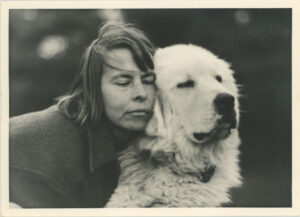Ann R. Stokes Papers
Ann Richardson Stokes (1931-2016) was an activist, artist, and community builder across such issues as progressive politics, women’s and lesbian/gay rights, and the environmental and antinuclear movements. Stokes was born and educated in New Jersey, the daughter of Dr. Emlen Stokes and Lydia Babbott Stokes, and the great grand-daughter of Charles Pratt. A lifelong Quaker and longtime member of Putney Friends Meeting, Ann moved to Welcome Hill in West Chesterfield, NH in 1959. She helped build and run the studio retreat for women artists, Welcome Hill Studios, which has been inspiring and nurturing artists since the 1970s, and in 1985 Stokes published an account of the all-woman-built first studio in “A Studio Of One’s Own.” Ann purchased a large parcel of land in West Chesterfield with stone ruins left by Madame Sherri, a vaudeville costume designer known for her entertaining, and carried on her party tradition by hosting Nina Simone, Odetta, the Arthur Hall African-American Dance Troupe and many others. Ann eventually donated the parcel now known as the Madame Sherri Forest with many sites and trails, including the Ann Stokes Loop named in her honor. A talented writer and painter, Ann penned numerous thoughtful letters to editors across the country, but was happy to engage personally in social action as well, such as when she was jailed for two weeks for protesting the Seabrook Station nuclear power plant in 1977 or when she ran, unsuccessfully, for Sheriff in West Chesterfield.
The Ann R. Stokes Papers document Ann’s varied and passionate life of art, community building, Quakerism, and activism. The building and story of Welcome Hill Studios, as well as Ann’s famous parties, are well documented with scrapbooks, photographs, and posters. Her engagement with the Putney Friends Meeting is evident through numerous records and correspondence. Family photo albums and scrapbooks document the Stokes extended family history, and Ann’s own writing, photographs, and art (mostly original paintings and prints) make up a bulk of the collection. Ann’s collection of women/lesbian organization’s newsletters, mostly from the 1980s-2000s, with titles such as Lezzie Fair, Open Closet, Lesbian Connection, the Revolutionary & Radical Feminist Newsletter, show her engagement with local and national women’s issues.


